Running A Business (According to Pat)
This article originates from Indulgemedia.com, written by Patrick Cunningham.
Last Thursday I had the pleasure of being invited to speak at the Young Enterprise Finals Night in Guernsey.
As an event that was attended by a large number of bright and talented young students who had just completed their first foray into entrepreneurship via the Young Enterprise scheme, I decided to share some of my experiences of running a business for the last 13 years.
Below are some slides and the transcript from the presentation.
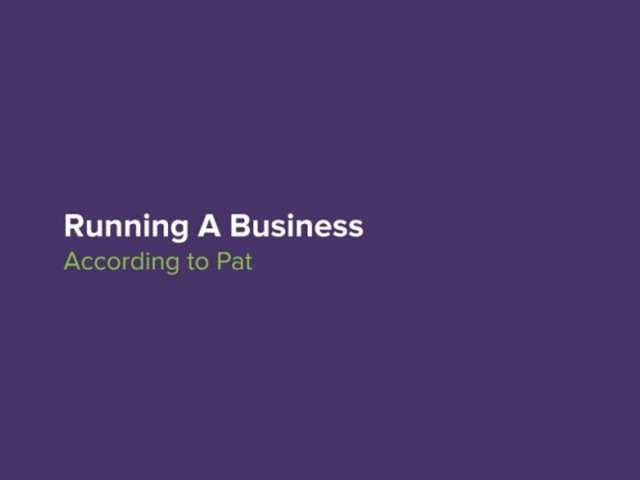
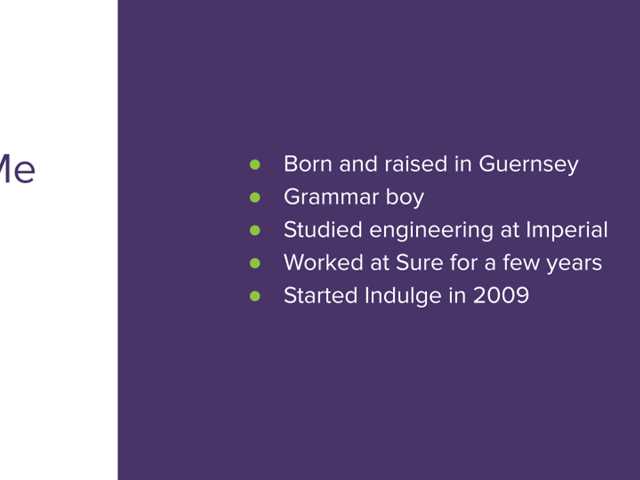
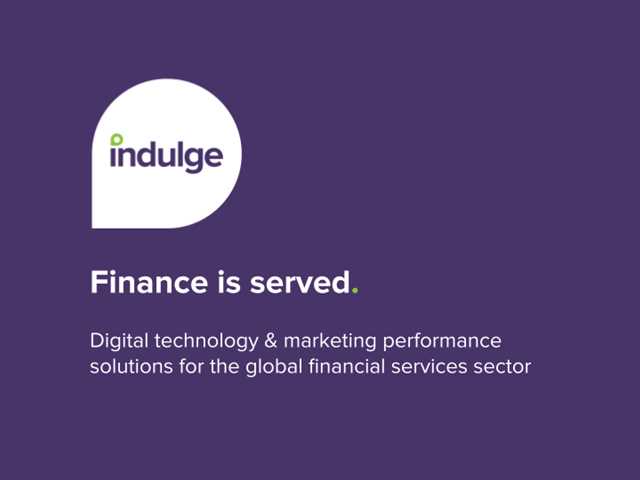
Indulge started as a full-service agency, but our digital nous quickly resulted in us becoming a purely digital firm. In our early days as well as knocking out sites for our own clients, we were building sites for a number of other creative agencies in Guernsey too, so decided to hang up our brand and print tools and focus purely on digital.
We didn’t really have any sort of specialism, aside from that we could design and build a good website, but this wasn’t a unique trait by any means.
Over the years our focus on quality helped us to win a number of larger clients across the government, professional services and finances sectors and we started to become really good at tackling much larger, more complex and challenging digital projects, whether that was a website, a piece of software or digital marketing campaign.
These days we focus our marketing efforts purely on the finance sector; we have done so much work in the finance industry, we have the credentials, and being a specialist in this vertical makes for a really compelling proposition.
Why did I start a business?
After I graduated I had a really good job at Sure and I was doing really well. I was fast-tracked through to management and by the time I left I was head of mobile for Guernsey, Jersey and the IoM.
So why did I leave such a promising career to go my own way?
Ultimately it came down to two things; freedom and passion. I was passionate about the Internet, and I loved building websites and software that used the Internet to solve problems. The thought of running my own agency, with the freedom to make business decisions and explore the Internet day in and day out was really attractive.
I did my research and it was clear that there was a gap in the market for a forward-thinking digital-focused agency. So I reached out to one of my long time friends, Russell, convinced him to come along for the journey, and the rest is history.
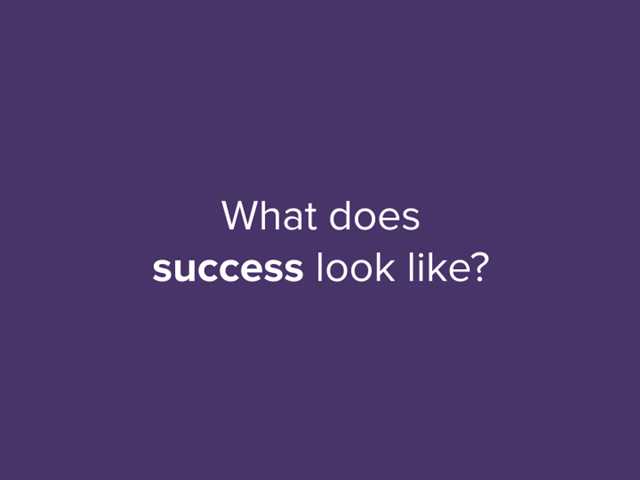
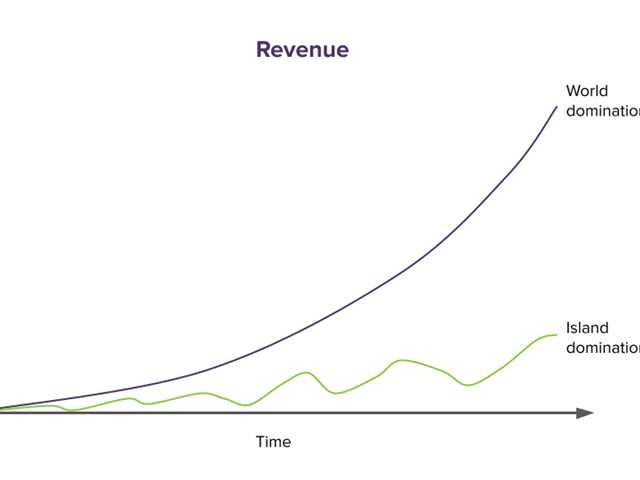
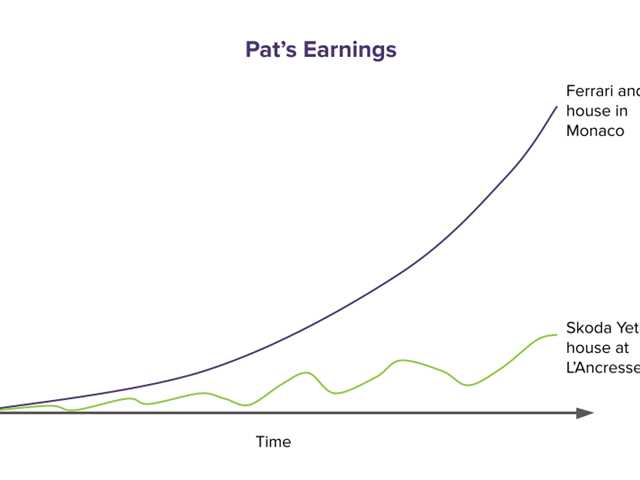
What does success look like?
What are you trying to achieve with this business? Are you running it as a lifestyle business, giving you the opportunity to do something you are passionate about every day or are you looking to scale the business quickly and sell it as a money-making exercise?
What do you want this business to look like in 1 year, 2 years, or 5 years? How does that translate into your short term strategy and goals?
What financial targets do you need to hit in order to get the business to where you want it to be?
Our original revenue forecast had us taking over the world within 5 years. However, in reality, island domination was all that we achieved. Not a failure by any means! I had similarly high hopes for my own earnings, but there's nothing wrong with a Skoda Yeti and a house at L'Ancresse, it's more than most people have! All jokes aside, I started Indulge as a lifestyle business. I love experimenting with technology, I always have and I always will. Having a job where I have the freedom to basically lark about on the Internet whenever I like is the dream for me. And whilst it hasn’t given me a life of luxury, I earn enough to live the life I want to live, whilst doing a job that I love, with the freedoms that come with running your own business. I’d say that’s a win.
You’ll need to put a lot of hours into managing your business. In the early days, Russ and I were ploughing upwards of 60 hours per week, which wasn’t sustainable, but it was the only way to get the business moving. But make sure you are not a hamster in a wheel, use techniques such as David Allen’s Getting Things Done method or The Eisenhower matrix to ensure that you are working on the important things and using your time wisely. Over time once your team builds you’ll be able to ease off a bit, as long as you are managing your business properly. These days our whole team work a maximum of 40h week including the directors; overtime is required sometimes, but it’s absolutely the exception rather than the norm. This is quite rare in the agency world, and it's something I'm really proud of.
Believe it or not, learning how to rest properly is a skill that you can develop. Learn how to take a break, meditate and turn off your devices. Work on improving your sleep habits. Tie up all your loose ends before going on holiday and ensure all your key staff and clients know. Burnout is a real thing that I have experienced and it’s not pleasant. But you can avoid it by ensuring that you stay productive when you are working, and switching off properly when you are not.
It's a rollercoaster
As the owner of a business, you will experience soaring highs and crushing lows. You need to make sure that during the highs you don't get too carried away, spend all of your money and develop a hubris that may ultimately be your downfall. Similarly, you need to ensure that during the lows you remain stoic, positive and push through.
Indulge has been through many cycles of incredible success followed by mediocre performance. One simple technique that I have learned to help myself get through the more challenging times is to "Expect the best, plan for the worst, and prepare to be surprised."
By planning for the worst case scenario you help to silence the doomsday voices in your head that are causing all of that anxiety. It also forces you to consider the more likely scenarios, which are all way more positive than that horrible worst case scenario that keeps you awake at night.
Here is a small subset of the emotions you'll experience in the day to day running of your business, however despite this, you need to try and keep a level head as much as you can at all times.
Bringing emotions into critical decision making can cloud your judgement, so if you are feeling an extreme emotional response to a decision, positive or negative, put that decision on hold for a day or two until you’ve calmed down a bit. Often you’ll have changed your mind after a night’s sleep.
I remember years ago one of our biggest clients was probably using up a third of the production resources of the agency, but they were only paying us for maybe 5-10%. As such, we were losing money hand over fist on that contract.
However, I was so emotionally attached to that client that I never discussed the issue with them for fear of them getting cold feet and leaving. Then when they finally did leave (not because we tried to bill more) it was like breaking up with a girlfriend. I literally grieved.
Reflecting on this later on I realised that the emotional attachment to this client, who had been so important in our early success, had really clouded my judgement and actually I should have just had a conversation with them about resources at the time. Doing this may well have resulted in a more positive overall client relationship and might ultimately have saved that client too.
These days we are much more on the ball with billing and we are always having frank discussions like this with our clients. Most of the time they are absolutely fine.
Similarly, we also accept that clients come and go, and sometimes there is nothing you can do about it, it’s just business. If a client does leave there is no point ruminating on it. Figure out why they left and if there is something you could have done better, make sure you take that learning away with you and move on.
Running a business is a rollercoaster, but you should never coast! As the age-old adage goes, if you aren’t growing you’re shrinking. If you start to take your business and your clients for granted, you’ll quickly lose your edge in the market. Take your foot off the throttle and you’ll find that over time your client base starts to erode as businesses merge, close down or move elsewhere due to your service levels or lack of progress. Always be thirsty for new clients, and keep up to date with developments in your industry. Staying one step ahead through R&D and training will ensure that you do not get left behind.
As the owner of a business, it will sometimes be hard to lift yourself out of the trenches, step back and focus on your long term strategy, however, this is critical to the success of your business. You need to step back often and review how you are performing against your goals.
People
Hiring and firing are one of the most difficult parts of running a business but also one of the most rewarding. Over the years we’ve employed some incredible people but we’ve also had to deal with the difficult task of managing redundancies and poor performance.
Make sure that anyone you hire has the right skills for the job, whether that is complementing the skillset already in the business, or expanding the resource on an existing skill set.
Staff need to be a good fit for the business too in terms of their approach to work and their attitude.
Getting the recruitment process right is so important because getting it wrong and ending up with an employee who isn’t a good fit can be really damaging to the whole business. Organising some recruitment training for the key staff that are doing the hiring can really pay dividends.
Getting an employment contract drawn up professionally before you hire any employees is also a really important step to protect both you and your employees.
Look after your employees well, pay them a good wage and a bonus for good performance, give them perks such as health insurance, flexible working hours, regular socials, decent maternity/paternity options and a birthday present. Celebrate your successes with the team, whether that is winning a new contract or hitting your annual targets.
Quarterly appraisals and regular 1 on 1 deep dive with your employees will also ensure that any issues are captured and nipped in the bud.
Your relationship with your business partners is also really important, it’s like a marriage really. And just like a marriage, it’s something that you need to nurture and work on. If you have any issues with your business partner make sure you get them out in the open early rather than let them fester.
Russ & I organise a directors lunch once a month where we are not allowed to talk about work, this alone provides huge benefits to our working relationship.
Don't be a control freak; in the early days of your business, you will be the main point of contact for everything, from buying stationery through to negotiating your first few contracts.
As your business grows and you take on staff you’ll need to learn to delegate responsibility and empower your staff to make decisions on behalf of the business.
By doing this you’ll free up your own time to focus on the really important stuff like working on your strategy for the next few years.
Your staff and your business will thank you.
Money
Make sure that you find a good accountant, and use a decent online accounting package such as Xero to handle your finances and your invoicing.
Set some financial targets and build and maintain a profit and loss forecast so that you can track your performance against these targets.
Try to forecast at least three months into the future, and keep your forecast up to date, as this will help to guide your short term strategy and highlight any upcoming financial challenges.
Stay on top of your costs, and think very carefully before committing to any long term increases in fixed costs such as rent or salaries.
In 2012 Indulge went through a rough patch; we had grown too quickly off the back of a couple of large projects, dramatically expanding our team and taking on an expensive lease on a large studio. When these projects came to an end we were unable to fill the gaps left in our pipeline. Our forecast told us that our costs weren’t sustainable, and we realised that if we didn’t do something we would be insolvent within a few months. We urgently had to cut costs and so we carried out a round of redundancies, which was a tough period for everyone involved, but it meant that Indulge continued to exist and ultimately grew from strength to strength.
This episode is something that will be etched into my mind for eternity, our hubris at the time almost broke us. It was a hellish experience, but I look back on it now as an experience that taught me many things and, as well as significantly thickening my skin, it humbled me and sharpened my business acumen.
Product
Your product is obviously key to the success of your business. Do your research before you start and take advice from friendly people in the industry. If you have a product that people don’t want you won’t succeed.
Quality is everything; you need to ensure that your product is of high quality in the context of the fee you are charging. If you are going in high, then your product needs to be the best in the market, hands down. If you are planning to undercut your competitors, then you should aim to match their quality at a minimum, otherwise, you don’t have any competitive advantage.
If your product is unique and is filling a gap that you have found in the market, get it right, because if your product doesn’t work, others will soon follow and take over.
Make sure that you have processes in place for your entire project workflow, from lead generation through to project testing and deployment. Don't be tempted to go down the 'processes are a waste of time' route; by taking this route you are basically making an active decision to wing it and as you grow chaos will inevitably ensue.
Recommendations will be a major contributor to new business in your founding years (and onwards) and if you don't produce a quality product people won't recommend you. Simple as that!
Diving deep into a niche can bring a number of benefits. Firstly it will give you an advantage over more generic 'all things to all men' competitors. You’ll also be able to charge more for your product or service. If you can define yourself as a leader in a particular space, companies or users in that space will actively seek you out.
Shout
Getting your own sales and marketing strategy right is so important and it’s something that, believe it or not, we’ve struggled with on and off for years. This is not uncommon in the agency world!
When you’re busy with client work and the day to day operations of the business it’s all too simple to turn your attention away from the sales and marketing to focus on the work and challenges currently at hand.
However the key to a successful sales and marketing is consistency, you always need to be working on it, whether that’s planning your next marketing campaign, following up on that old lead, reviewing your existing client base for upsell opportunities. You stop doing for this a month or two, then two or three months down the road your pipeline will be empty and you’ll be forced to take on work that isn’t a good fit just to pay the bills. This work then takes way more time than it should, further removing your focus from things like sales and marketing, it’s a vicious cycle.
Get your sales and marketing strategy right from the start and make sure you keep at it, this will help to avoid this famine or feast cycle that so many businesses suffer with.
Ask a grown-up
And finally, the most important lesson that I have learned over the years. If I was able to speak to a much younger and fresher faced 2009 version of Pat and give him one piece of advice, it would be to find someone who has been through the process of running a successful agency and bring them on board as an advisor or a NED. You cannot really understate the value that an experienced veteran can bring to a business.
We did very well as a start-up, but we would have performed much better if we had had someone to point out our mistakes and stop us from making them. Some of our silly mistakes in the early days significantly hindered our growth.
We finally brought an advisor into our business in 2019 and the changes that we have rolled out since then have been really transformative. It's never too late!



